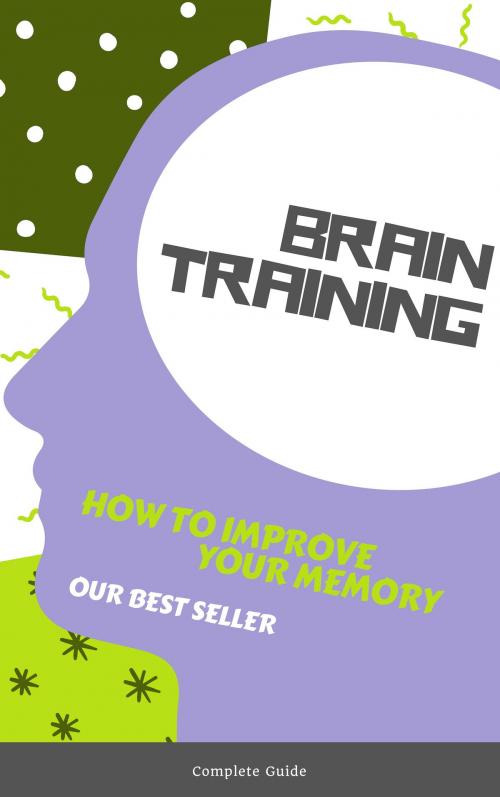How to improve Your Memory
Brain Training
Nonfiction, Health & Well Being, Self Help, Self Improvement, Memory Improvement| Author: | Baptiste | ISBN: | 1230002736846 |
| Publisher: | Baptiste | Publication: | October 25, 2018 |
| Imprint: | Language: | English |
| Author: | Baptiste |
| ISBN: | 1230002736846 |
| Publisher: | Baptiste |
| Publication: | October 25, 2018 |
| Imprint: | |
| Language: | English |
Why It's Important to Train Our Brains
For as much as we believe we train our brains and give them a good workout, we seldom actually do it on a regular basis. In most cases, our brains are not used in a balanced way. We're creatures of habit. We find a way to do things that we consider comfortable and we seldom change our ways.
Many of the physical activities we perform each day are done with one side of our body, without even giving it much though. If we're not giving something much thought, we're not exercising or training our brains.
We also get very set in the way we feel emotionally about things or people, which does not give our brains much stimulation or cause for thought. These are not things we consciously set out to do in our lives but rather habits that have developed because of the way our brains function, mostly because of genetics. For instance, it's not our choice to be right handed. It just happens that way, and we seldom give it much thought.
We are also the result of year's old biological factors that affect our skills, moods and social habits. Our brains and brain functions are also the result of our culture and upbringing. Although many of us argue the old nature versus nurture theory, studies indicate that training our brains to be more active can play an important role in how we act, feel and how successful we are in life.
It makes sense that someone that works at solving word or mathematical problems every day is going to have more brain activity than someone does that sleeps half the day and watches cartoons the other half. The more we work our brains, the better our brains are going to work for us.
While there's a strong belief that brain training is beneficial for individuals that may suffer from poor memory or lack of concentration, brain training is actually recommended for anyone with a brain. Our brains needs steady stimulation to become motivated to work for us in the way we need it to work.
Brain training has been used for patients with learning disabilities, insomnia, cognitive impairment, traumatic brain injury, attention deficit and more. It's been known to help people improve their focus and concentration.
Brain training therapists feel that brain training exercises are highly beneficial in keeping our brains young and healthy. Many brain training games are now on the market. While the games may not be scientifically proven or endorsed, the users feel they have made a real difference in their lives.
Why It's Important to Train Our Brains
For as much as we believe we train our brains and give them a good workout, we seldom actually do it on a regular basis. In most cases, our brains are not used in a balanced way. We're creatures of habit. We find a way to do things that we consider comfortable and we seldom change our ways.
Many of the physical activities we perform each day are done with one side of our body, without even giving it much though. If we're not giving something much thought, we're not exercising or training our brains.
We also get very set in the way we feel emotionally about things or people, which does not give our brains much stimulation or cause for thought. These are not things we consciously set out to do in our lives but rather habits that have developed because of the way our brains function, mostly because of genetics. For instance, it's not our choice to be right handed. It just happens that way, and we seldom give it much thought.
We are also the result of year's old biological factors that affect our skills, moods and social habits. Our brains and brain functions are also the result of our culture and upbringing. Although many of us argue the old nature versus nurture theory, studies indicate that training our brains to be more active can play an important role in how we act, feel and how successful we are in life.
It makes sense that someone that works at solving word or mathematical problems every day is going to have more brain activity than someone does that sleeps half the day and watches cartoons the other half. The more we work our brains, the better our brains are going to work for us.
While there's a strong belief that brain training is beneficial for individuals that may suffer from poor memory or lack of concentration, brain training is actually recommended for anyone with a brain. Our brains needs steady stimulation to become motivated to work for us in the way we need it to work.
Brain training has been used for patients with learning disabilities, insomnia, cognitive impairment, traumatic brain injury, attention deficit and more. It's been known to help people improve their focus and concentration.
Brain training therapists feel that brain training exercises are highly beneficial in keeping our brains young and healthy. Many brain training games are now on the market. While the games may not be scientifically proven or endorsed, the users feel they have made a real difference in their lives.















